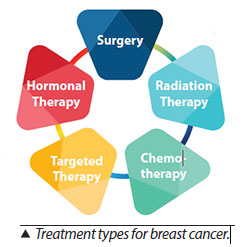Hormone Therapy
What are hormones and how are they used as therapy?
Hormones are chemicals that are naturally produced by the organs making up the body’s endocrine system (including the pancreas, as well as pituitary, thyroid and adrenal glands). These chemicals travel throughout the body via the bloodstream, coordinating the functions of various organs from head to toe. Hormones are responsible for regulating the function of just about every cell in the body. Some examples of hormones include: estrogen, testosterone, insulin, thyroid hormone, cortisol, and epinephrine.
 Researchers have determined that some cancers are “fueled” by hormones, and may rely upon them to grow. In these cases, blocking the action of these hormones could possibly stop the cancer from growing. There are a few ways in which this can be achieved:
Researchers have determined that some cancers are “fueled” by hormones, and may rely upon them to grow. In these cases, blocking the action of these hormones could possibly stop the cancer from growing. There are a few ways in which this can be achieved:
- Block the hormones from acting: Cells have “receptors” on their surface where certain hormones bind and subsequently trigger activity inside the cells. By blocking the receptor with another compound, the hormone is not able to connect to its receptor. So if the hormone’s normal “parking spot” on the cell is already occupied, the hormone cannot attach to and activate the cell.
- Prevent the body from producing the hormone: This can be done with medication to block production of the hormone, or with surgery to remove the organ that produces it. For example, estrogen production can be significantly decreased by surgically removing the ovaries.
- Eliminate the hormone receptors on cells or change their shape: This makes it impossible for the hormone to properly attach itself to the cell receptor and to activate it, essentially making the hormone unable to function.
Hormone therapy that is used to treat certain cancers should not be confused with hormone replacement therapy. Hormone therapy is used to block hormones or their actions, whereas hormone replacement therapy, which is not a cancer treatment, generally refers to giving menopausal women hormones to replace the ones the body no longer makes in order to treat menopause-related symptoms.
How is hormone therapy given?
Hormone therapy is most often used to treat breast and prostate cancers, where its role is well established through numerous clinical trials. Meanwhile, research is ongoing to study the potential efficacy of hormonal manipulation in treating other cancer types. Hormone therapy can be given in a few ways:
- Oral medication – some therapies are taken by mouth
- Injection – some therapies are given by an injection under the skin (subcutaneous) or in the muscle (intramuscular)
- Surgical intervention – for example, removal of the ovaries in women, or testicles in men, results in decreased production of certain hormones.
Many patients think of hormone therapy as being “less potent” than chemotherapy, but it can be just as effective in certain breast and prostate cancers. Hormone therapy is considered a “systemic” therapy, meaning that it travels throughout the body. Surgery or radiation therapy are considered “local” treatments.
